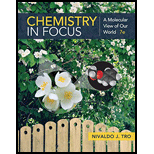
Interpretation: The given compound having the higher boiling point is to be identified.
Concept Introduction:
A hydrocarbon is organic compound consisting entirely of hydrogen and carbon.
The temperature at which the vapour pressure of the liquid is equal to the pressure exerted on the liquid by the surrounding atmosphere is called boiling point.
The boiling point of a molecule depends upon intermolecular forces and thermal energy.
Intermolecular forces keep the molecules together. Greater the intermolecular force, higher is the boiling point.
All atoms and molecules possess dispersion forces which depend upon their molar mass.
Polar molecules possess dipole forces between them which depend upon the polarity of the molecules.
A molecular formula consists of the
Dispersion forces are weak intermolecular forces and are considered van der waals forces.
Temporary dipoles can occur in non-polar molecules when the electrons that constantly orbit the nucleus occupy a similar location by chance.
Higher the molar mass, higher is the magnitude of the dispersion forces, and hence, higher is the boiling point.
Answer to Problem 12.1YT
Solution:
Explanation of Solution
The boiling point of a molecule depends upon the intermolecular forces and the thermal energy. Intermolecular forces depend upon dispersion forces and dipole forces. The molecules,
Since the molar mass of
The boiling point of
Want to see more full solutions like this?
Chapter 12 Solutions
Chemistry In Focus
- Comment on the following paragraph. In halides, MXn stoichiometry does not require a value of n so large as to prevent the approach of M+ ions, for steric or electrostatic reasons.arrow_forwardExplain Wade's rules, Indicate what the letters S and n represent in the formula.arrow_forwardShow work. Don't give Ai generated solutionarrow_forward
- Hi, I need help on my practice final, If you could offer strategies and dumb it down for me with an explanation on how to solve that would be amazing and beneficial.arrow_forwardHi I need help with my practice final, it would be really helpful to offer strategies on how to solve it, dumb it down, and a detailed explanation on how to approach future similar problems like this. The devil is in the details and this would be extremely helpfularrow_forwardIn alpha-NbI4, Nb4+ should have the d1 configuration (bond with paired electrons: paramagnetic). Please comment.arrow_forward
 Introduction to General, Organic and BiochemistryChemistryISBN:9781285869759Author:Frederick A. Bettelheim, William H. Brown, Mary K. Campbell, Shawn O. Farrell, Omar TorresPublisher:Cengage Learning
Introduction to General, Organic and BiochemistryChemistryISBN:9781285869759Author:Frederick A. Bettelheim, William H. Brown, Mary K. Campbell, Shawn O. Farrell, Omar TorresPublisher:Cengage Learning Chemistry: The Molecular ScienceChemistryISBN:9781285199047Author:John W. Moore, Conrad L. StanitskiPublisher:Cengage Learning
Chemistry: The Molecular ScienceChemistryISBN:9781285199047Author:John W. Moore, Conrad L. StanitskiPublisher:Cengage Learning Chemistry: Principles and ReactionsChemistryISBN:9781305079373Author:William L. Masterton, Cecile N. HurleyPublisher:Cengage Learning
Chemistry: Principles and ReactionsChemistryISBN:9781305079373Author:William L. Masterton, Cecile N. HurleyPublisher:Cengage Learning General Chemistry - Standalone book (MindTap Cour...ChemistryISBN:9781305580343Author:Steven D. Gammon, Ebbing, Darrell Ebbing, Steven D., Darrell; Gammon, Darrell Ebbing; Steven D. Gammon, Darrell D.; Gammon, Ebbing; Steven D. Gammon; DarrellPublisher:Cengage Learning
General Chemistry - Standalone book (MindTap Cour...ChemistryISBN:9781305580343Author:Steven D. Gammon, Ebbing, Darrell Ebbing, Steven D., Darrell; Gammon, Darrell Ebbing; Steven D. Gammon, Darrell D.; Gammon, Ebbing; Steven D. Gammon; DarrellPublisher:Cengage Learning Chemistry: An Atoms First ApproachChemistryISBN:9781305079243Author:Steven S. Zumdahl, Susan A. ZumdahlPublisher:Cengage Learning
Chemistry: An Atoms First ApproachChemistryISBN:9781305079243Author:Steven S. Zumdahl, Susan A. ZumdahlPublisher:Cengage Learning





